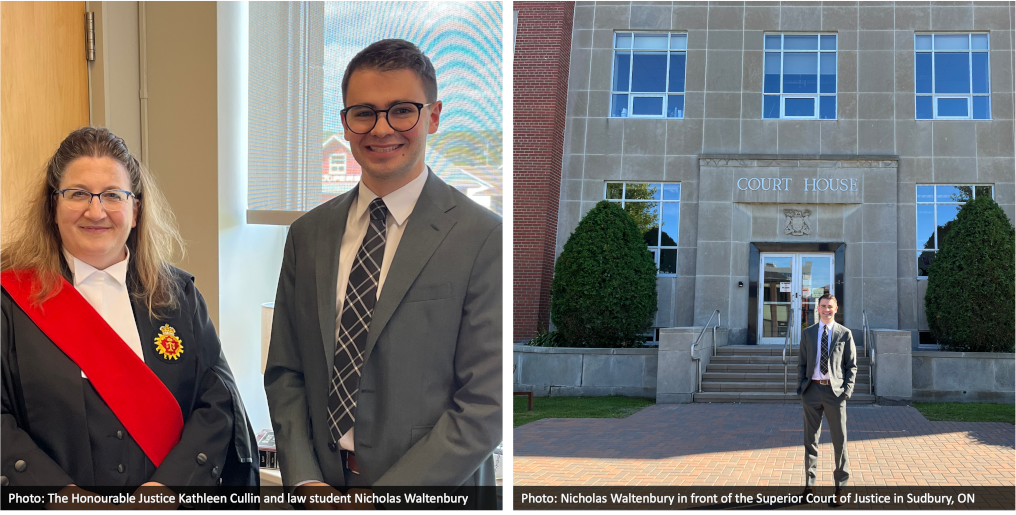My Judicial Internship at the Superior Court of Justice: A Real-World Learning Experience

In this blog post, Nicholas Waltenbury shares his judicial internship experince during the summer of 2022.
This past summer I had the immense privilege of participating in the Judicial Internships Across Canada program through the CIAJ. After completing my summer internship with the Ministry of the Attorney General in Toronto, I headed up to Sudbury, ON to shadow Justice Kathleen Cullin of the Superior Court.
During my short time at the court, I had the opportunity to observe a wide range of cases, including an easement dispute between neighbours, a commercial lease dispute between a landlord and tenant, a second-degree murder sentencing hearing, a Charter s. 11(b) claim related to serious criminal charges, a settlement conference for a negligence claim involving a municipality, and numerous family law case conferences.
I was struck by the diversity in legal issues that Superior Court judges adjudicate. Justice Cullin issued orders, wrote decisions, and mediated settlements on extremely complex issues of law in criminal, contract, tort, and family cases—sometimes on the same day. While it may be true that lawyers often develop a niche practice area, judges are expected to be generalists and specialists simultaneously. I believe this not only underscores the difficulty of their work, but also the importance of counsel’s responsibility to present the presiding judge with clear and concise arguments on their client’s behalf. In fact, the process of presenting the facts of the case, summarizing relevant precedents, common law, and legislation, and making argument via analogy was not unlike that which we are asked to do on law school exams—a pleasant surprise for me after an intense first year at McGill!
I was fortunate that Justice Cullin heard cases both in person and by Zoom, which offered me the chance to experience the pre- and post-pandemic way of adjudication and evaluate the benefits and challenges of each approach. I learned that virtual court offers flexibility and efficiency that can benefit all parties in the appropriate circumstances. There was clearly a desire to maintain at least some of the changes that the pandemic rapidly forced upon the court system. At the same time, I observed some of the challenges that parties continue to experience while using this technology, highlighting the need for further IT resources and training for all participants in the justice sector.
Perhaps most surprising to me was the significant volume of case management that judges undertake. As a first-year law student, I spent most of my year reading reasons for judgment from appellate courts. It was, therefore, easy to imagine a judge’s exclusive role as adjudicating trials and writing lengthy decisions. In reality, I learned that up to three quarters of a judge’s time is spent on case management to ensure that trials are both efficient and necessary. The value of this work was clear as I observed the partial or complete resolution of numerous cases following pretrial and settlement conferences. It was an incredible learning experience to watch Justice Cullin help the parties navigate their dispute by offering a candid perspective on the issues that might be adjudicated at trial and moving the parties toward resolution—sometimes only after numerous appearances at case conferences. This is a function of the justice system that we have very little awareness of as students and one that has significantly altered my understanding of the role of courts.
Being born and raised in North Bay, ON, I was thrilled to be placed in the Northeast Region and paired with a judge who was familiar with the unique challenges and opportunities that the north presents for both jurists and parties. As soon as I arrived, I could feel the small-town atmosphere in the building. The legal community in a Northern Ontario city is much smaller than what you might find in a major urban centre; judges, court staff, and counsel know each other well and cross paths frequently, underscoring the importance of practicing integrity, collegiality, and reasonableness. It was also clear that Justice Cullin is intimately familiar with the community she serves and sees her role extend beyond pure judicial adjudication. I watched as Justice Cullin helped parties (especially those who were self-represented) access local services and supports to help address the various elements of their legal dispute. This experience helped me contextualize the “local” principle of superior courts—local people adjudicating local problems, where everyone involved in the dispute has a stake in the outcome because they are all a member of the same (in this case, small) community. The experience reminded me of what I value most from my upbringing and hope to keep with me, regardless of where I eventually practice law.
In true Northern Ontario fashion, the entire Superior Court team in the Northeast Region went to great lengths to welcome me to the city and take interest in my time at the court. The court staff made time to explain their roles and help me get set up with all the resources I needed to make the most of the week. The judicial law clerk (who only started her role two weeks before I arrived!) helped me navigate the building and kindly answered questions I feared were too trivial for Justice Cullin. Other Superior Court judges, namely Justice Hennessy and Justice Cornell, kindly discussed their cases with me and offered reflections and advice about my academic and professional pursuits.
I am particularly indebted, however, to Justice Cullin who went above-and-beyond to ensure my time in Sudbury was well-rounded and worthwhile. She offered her time before and after each proceeding, so I knew what to watch for and had a chance to reflect and ask questions on what I observed. Her willingness to engage with me throughout the week allowed me to gain valuable insights into our court system and the role of a judge. I truly could not have asked for a more meaningful learning experience.
It is difficult to describe how much this experience helped me contextualize the concepts I learned during my first year of law school and start to understand the “bigger picture” of Canada’s justice system. I cannot recommend this program highly enough to any law students seeking to complement their classroom education with a real-world learning experience at a court. I am extremely thankful to Justice Cullin, the CIAJ, and all of the judges across the country who participate in this program for providing such an incredible opportunity for Canadian law students.

In 2019, CIAJ has created a Judicial Internships Across Canada program in order to provide law students with the possibility to participate in a judicial internship at the provincial, federal or administrative level. Internships take place between May 1 and September 1 of the current year, over the course of one week or more depending on the availability of participating judges.
Learn more about CIAJ’s activities for law students: https://ciaj-icaj.ca/en/membership/student-section/
Are you interested in contributing to the work of CIAJ? Contact us! https://ciaj-icaj.ca/en/our-network/working-at-ciaj/

